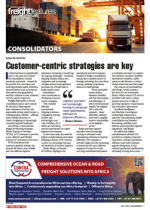The days of a one-size-fits-all approach to logistics are long gone. In today’s fast-paced global trade environment, clients demand a dynamic and efficient mix of transport modes tailored to their unique needs.Nowhere is this more apparent than in the consolidation space, where agility, responsiveness and service customisation have become critical.“The logistics landscape is constantly evolving – especially when it comes to consolidation,” said Michelle Horner, trade and WWA manager for SACO. “As client demands shift and supply chain pressures intensify, consolidators must prioritise f luidity and f lexibility across their global service offerings.”This adaptability extends beyond just operations – it’s also about value. “The consolidation market has become one that is rate-driven,” said trade specialist Kreeson Moodley. “However, that doesn’t mean clients are willing to accept sub-par service. They expect quick and efficient transit times with minimal transhipment handling.”According to Horner, there has been a shift towards end customers moving stock and cargo with a just-in-time methodology. “Whether it be pricing, stock control or a downturn in orders, buyers’ consolidations are becoming more popular. This tactic does require more forward planning of cargo movement, while keeping a close eye on global carrier trends, pricing, transit time and equipment availability.”At the same time, the consolidation market is becoming increasingly competitive, driven by the entry of new players into the industry. “As a result, consolidators are working to ensure market differentiators by offering bespoke services to meet the increasing and varying demands in a f luctuating environment,” a dded Mood ley.Horner highlighted several ongoing challenges in the consolidators’ market. “Limited carrier choice, last-minute vessel schedule amendments, port delays, equipment shortages and failures, as well as poor weather conditions continue to challenge the South African market – both on imports and exports. That said, we have seen some improvement in turnaround times compared to late 2023 and 2024.”Economic instability has also had a direct impact on shipping costs and the overall demand for services. “We have recently seen carrier rates softening from Asia and Europe into South Africa, and as such, a lower demand for consolidation services,” said Moodley, highlighting that maintaining responsible pricing while ensuring schedule integrity across all consolidation services was a critical factor for groupage operators.Another challenge negatively impacting consolidation cargoes is the increasing complexity around the loading of hazardous cargo. “As dangerous goods (DG) risk models evolve and declaration requirements become more stringent to ensure improved safety and security, approvals for DG consolidation cargo generally require a more detailed and complex process,” said Horner.Volumes are not expected to increase significantly in 2025. Both Horner and Moodley anticipate a slight downturn in the market as carrier freight rates continue to soften. Uncertainty over global trade agreements continues to be another major contributor to shifting market trends and ongoing global economic instability, adding another layer of complexity for consolidators navigating this landscape. LV

